Review for Brynhildr In The Darkness - Complete Collection
Introduction
I really should reconsider my blanket ‘review all anime regardless’ policy. That nearly caused my brain to fritz at the sheer Dragon Ball overload the last few years, to the point that I had to give up a couple of volumes into Kai. This time I asked to review Brynhildr in the Darkness without knowing the first thing about it. Usually that’s a good thing, as I can approach the show without preconception and prejudice. The delight when I find something special makes it all worthwhile. But sometimes I get a show, start watching it, or learn something about it that makes me think I really should have researched it first. A couple of days before I got around to reviewing Brynhildr in the Darkness, Animatsu launched their promotion of the show, with a proud, “From the Creator of Elfen Lied”. Elfen Lied is a fan favourite, but really only down to its controversy. It’s a show that does nasty, exploitative, gory violence, alongside light, sexy harem comedy, and it raised more than a few eyebrows on its release. It’s a show that fans watched, almost as a rite of passage, but for me it never stood up to repeat viewings. So instead of the blank slate, I start off watching Brynhildr in the Darkness expecting more of the same.
Ryota Murakami seems like a normal, well adjusted high school student, but his whole life has been determined by one mistake that he made ten years previously. As a child, his best friend was a girl that he called Kuroneko, and they both had a fascination for the stars. Kuroneko even claimed to have seen an alien, and offered to take Ryota to show him. An accident left Ryota badly injured in hospital, but it was only when he had healed, and was released that he learned that Kuroneko had died in the fall. Since then, he’s spent his nights gazing at the stars, working towards a career in science, swearing to find the aliens that so fascinated Kuroneko. Then one day a girl transfers into his class, Kuroha Neko, who looks just like Kuroneko grown up. She outright states that she has never seen Ryota before, but that doesn’t stop her from saving his life... using magic!
Kuroha is a witch or so she claims. She’s not alone either, and it turns out that she and several other witches have escaped from the laboratory where they were created and experimented upon. They’ve been engineered to have special powers, she has destructive strength, her paralysed friend Kana can see the future, other witches have other abilities, and they’re all hiding from people who will do anything, kill anyone to stop their secret research getting out. What’s more the witches are all under a literal death sentence, their lives constrained and limited by the technology that created them. Ryota ought to stay well clear, but if there’s any chance that Kuroha is in fact Kuroneko, there’s no way that he can.
13 episodes of Brynhildr in the Darkness plus the OVA are presented across two Blu-rays from Animatsu.
Disc 1
1. While I Wait For You
2. Witch
3. Death Suppressants
4. Lost Memories
5. Astronomical Observation
6. The Reason For Her Smile
7. Fragments of Hope
8. The Clue Left Behind
9. Fake Memories
Disc 2
10. Proof She’s Alive
11. A Sudden Reunion
12. Hexenjagd
13. That Which I Want To Protect
OVA. Much Ado About Nothing
Picture
Brynhildr in the Darkness gets a 1.78:1 widescreen transfer at 1080p ratio across two BD 50 discs, which makes the episode distribution a little lop-sided. It’s the usual HD presentation for an anime, clear and sharp throughout, smooth, progressive animation, and with little in the way of visible compression, except maybe some digital banding if you really look for it. The animation itself is unspectacular, with somewhat generic character designs, a familiar world design, and action sequences that serve the story adequately, but don’t really stick in the mind as something special. It doesn’t particularly do anything badly; Brynhildr’s visuals just aren’t memorable.
The images in this review were kindly supplied by Animatsu.
Sound
You have the usual choice between DTS-HD MA 2.0 Stereo English and Japanese, with locked translated subtitles with the Japanese track, and signs only with the English track. I checked to see that the dub existed... it did, and then opted for the original language track, which is pretty much par for the course, with generic characters getting generic voices, actors delivering decent performances, but failing to really stick in the mind. The dialogue is clear, the stereo does enough to make the action sequences have impact, and the music is adequate, although the second opening theme song is a piece of death metal so odious that I just had to skip it. The subtitles are timed accurately and free of typos.
Extras
The discs present their content with static menus, and English language credit scrolls follow each episode. Disc 1 autoplays with a trailer for Knights of Sidonia, and you’ll find it again, along with Vampire Hunter D, Hamatora the Animation and Appleseed in the trailers on disc 2.
Disc 2 also has two textless opening sequences, and three textless closing sequences.
Conclusion
It’s obvious that I have problems with a show when I simply dread putting the disc in to watch the next episode for review. I normally watch a couple of episodes of a show a night, choosing to let the story sink in, and give me a better chance of appreciating it. That allows me to savour some shows even when I have to hit review deadlines. But it also means that I wind up spending seven days on a show such as Brynhildr in the Darkness, and having seven consecutive nights where I wished that I was watching something, anything else instead just isn’t good. To put it mildly, Brynhildr in the Darkness spent its time treading water that Elfen Lied has already peed in.
It is pretty much the same story, a teenage, high school boy with traumatic childhood memories of a girl he was close to, a secret lab experimenting on girls with strange and dangerous powers, and a bunch of girls escaping from the lab, and coming to live with said boy, and the perils that ensue when the lab wants to recover its property, or at the very least, stop it from falling into the wrong hands. Brynhildr manages to do it without the infantilised sexuality, and the wholesale slaughter of innocents, but it is still very much the same story. And as I previously mentioned, I wasn’t a fan of Elfen Lied. If ever a recommendation such as ‘if you’re a fan of a, you will like b’ was appropriate, this would be the time. So if you liked Elfen Lied and want more, then Brynhildr in the Darkness is the show for you.
For me, I had the exact same problems with Brynhildr that I did with Elfen Lied, namely the light, harem comedy at odds with the exploitative violence in the show. You have your hapless teen male as usual, surrounded by a harem of teenage beauties, all wanting him to be the one. This being a more adult, juvenile show, boobies will be bared at least once an episode, there will be teasing, sexual innuendo, and a whole lot of awkwardness and stumbling. And there will be the odd gruesome death and extreme violence, and the traditional demise of screen witches, melting away (although no-one ever exclaims, “What a world, what a world!”). It makes laughing at the comedy something of an uneasy prospect, while it’s also hard to relate to the characters in the more dramatic moments.
The story itself begins on an interesting note, the idea of these laboratory created witches is an intriguing one, and even though Ryota’s tragic past, leading to a mysterious, potential reunion is a clichéd plot, it’s still enough to engage the interest of the viewer. As so often happens in shows such as these, an agency is able to simply scoop up subjects to experiment on without a major outcry about an epidemic of missing persons, so you do have to take some of the premise with a pinch of salt. But the concept around these witches, engineered with superpowers, but requiring drugs to stay alive as a control measure and fitted with a device that acts as a further control, should make for a fast-paced and emotional drama. It should always be a constant race against time to stay alive, to stay out of the agency’s control, to get the drug they need. The comedy puts paid to that potential drama.
And as the show progresses, it increasingly becomes clear that the writers, the creator were just making it up as they went along, rather than having some distinct set of rules for their universe, a direction pre-planned for the story. It turns out to be a poorly written, manipulative piece of nonsense. My heart sank when a certain witch was rescued, and was in the process of being inducted into Ryota’s harem, with everyone getting enthused about having a new friend, and then the plot yanks the rug out with an untimely death. And before that has a time to sink in, it layers on the tragedy even more. By the time the conclusion comes around, the psychopathic villain is revealed in all his psychopathic glory, long lost sisters unveiled, and an End of Evangelion, ‘everything turns to goop’ ending threatened, before the actual ‘please, please, let us have a second season’ ending is delivered.
I actually prefer Elfen Lied more, as while it does have its mish-mash of dark and light, the overall tone is always foreboding. In Brynhildr, the tone is all over the place, and quite frankly I had more than I could take of cry-baby Ryota and his witchy harem. But as I said, if you like Elfen Lied, you might as well give this a shot...
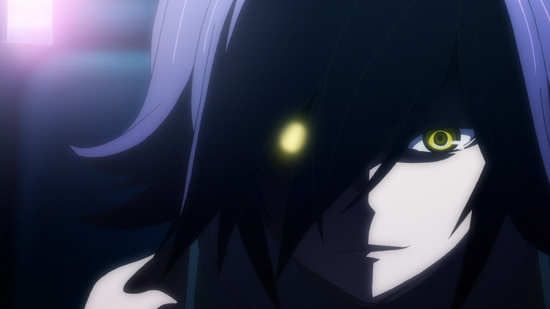
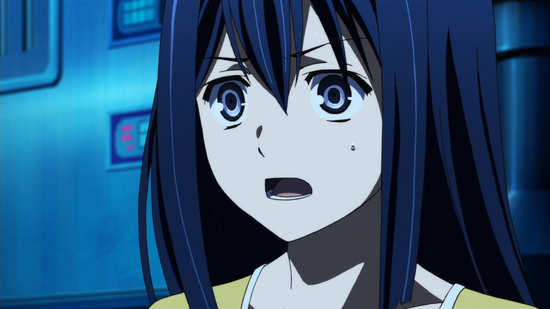
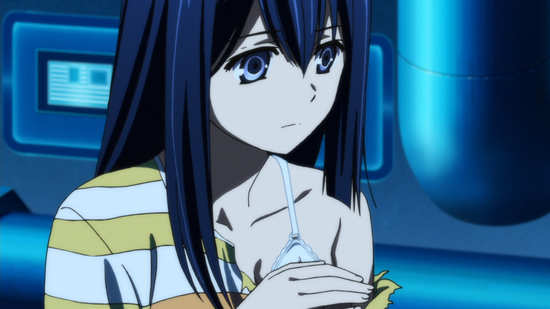

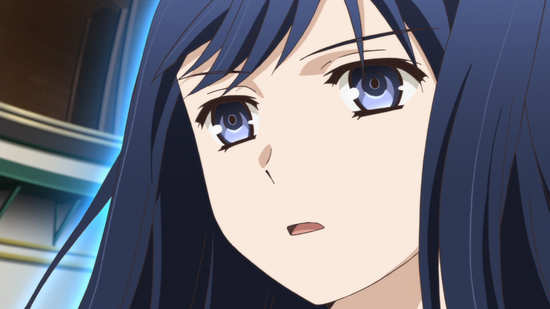
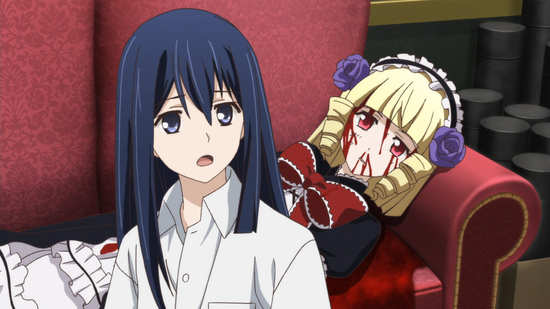
Your Opinions and Comments
Be the first to post a comment!